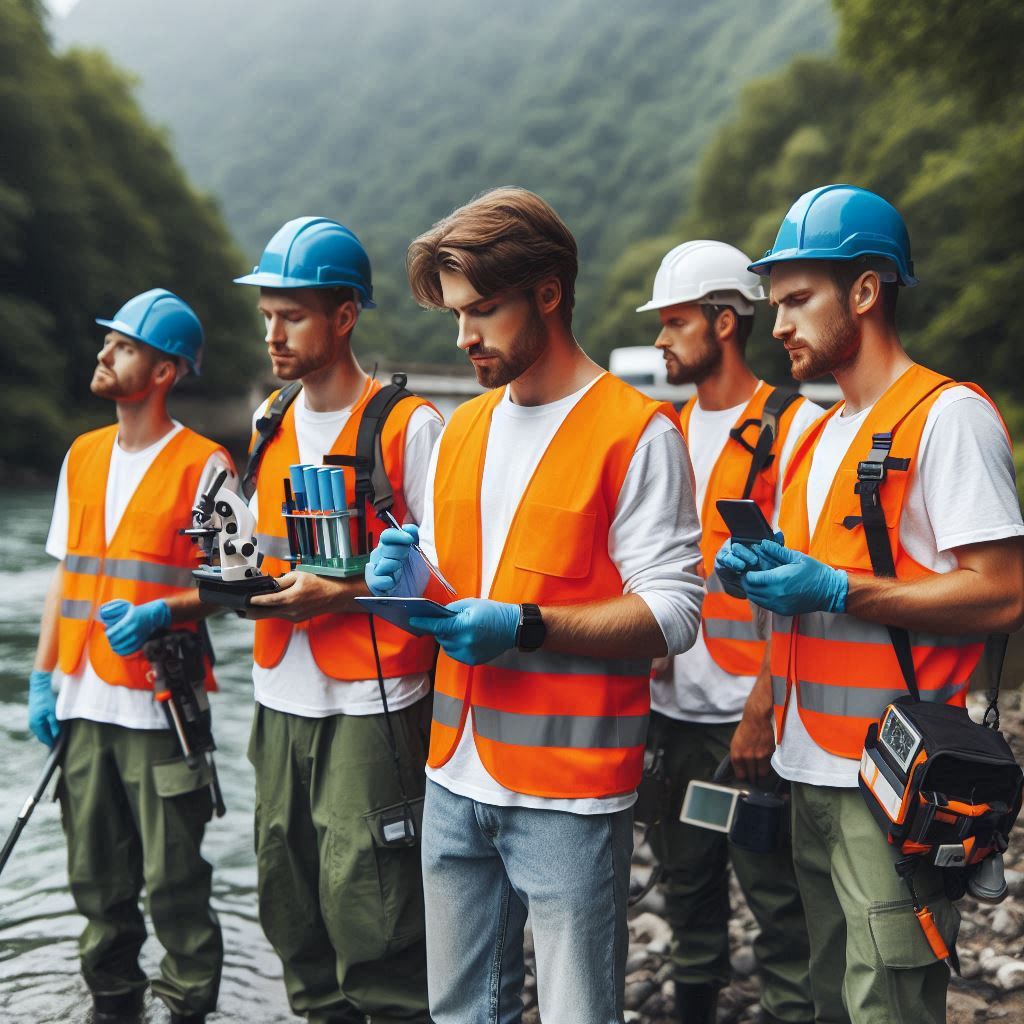Introduction
Hydrologists study water movement, distribution, and quality within various environments.
They analyze data to solve water-related issues and manage resources effectively.
Their work impacts agriculture, urban planning, and environmental conservation.
Career progression in hydrology is essential for professional growth and expertise.
Junior hydrologists typically assist in data collection, field studies, and basic analysis.
They gain practical experience and learn from senior colleagues in this role.
As hydrologists advance to mid-level positions, they take on more responsibilities.
They lead projects, manage teams, and communicate findings to stakeholders.
This progression enhances their leadership skills and deepens their understanding of complex hydrological issues.
Senior hydrologists play a critical role in shaping water management policies.
They conduct advanced research and mentor junior staff.
Their experience allows them to tackle significant challenges, such as climate change and water scarcity.
Career progression benefits the individual and the field as a whole.
Experienced hydrologists contribute valuable insights, promote sustainable practices, and drive innovation.
Investing in professional development ensures that the field remains adaptable and knowledgeable about emerging challenges.
Career progression is vital in hydrology.
It fosters expertise and leadership, ultimately benefiting society’s ability to manage water resources sustainably.
Education and Training Required
Bachelor’s degree in hydrology, geosciences, or related field
A career in hydrology typically begins with a bachelor‘s degree.
Students often pursue degrees in hydrology, geosciences, or environmental science.
These programs provide essential knowledge in water resources, environmental systems, and data analysis.
Coursework includes hydrology, geology, statistics, and environmental science fundamentals.
Internships during undergraduate studies offer practical experience and networking opportunities.
Students gain hands-on skills and insights into real-world hydrology applications.
Many employers value candidates with relevant internship experience.
Graduates often secure entry-level positions as junior hydrologists or research assistants.
Master’s or Ph.D. for advancement to senior positions
To progress in their careers, junior hydrologists may pursue a master‘s or Ph.D.
Advanced degrees provide specialized knowledge and research skills.
A master‘s degree often focuses on specific hydrology topics like water resource management or environmental modeling.
This degree allows professionals to take on more complex projects and responsibilities.
A Ph.D. is typically required for senior hydrologist positions.
This advanced degree emphasizes original research and in-depth study of hydrological processes.
Ph.D. holders often lead research projects and contribute to scientific publications.
They may also teach at universities or mentor emerging professionals in the field.
Professional Certifications and Licenses
Professional certifications enhance a hydrologist’s credentials and job prospects.
Certifications demonstrate expertise and commitment to ongoing professional development.
Organizations like the American Institute of Hydrology (AIH) offer certification programs for hydrologists.
Obtaining certification can make candidates more competitive for senior roles.
Licensing is crucial for hydrologists working in public sectors.
Many states require hydrologists to obtain a Professional Hydrologist (PH) license.
The licensing process typically involves meeting educational requirements, gaining work experience, and passing a comprehensive exam.
Licensed hydrologists often oversee public water resources and ensure regulatory compliance.
Building Skills for Career Advancement
Junior hydrologists should focus on developing essential skills for career progression.
Strong analytical skills are vital for data interpretation and problem-solving.
Effective communication skills help hydrologists convey complex findings to diverse audiences.
Collaboration and teamwork are equally important, as hydrologists often work with engineers, planners, and policymakers.
Networking is essential for career growth.
Attending conferences and joining professional organizations enables junior hydrologists to connect with industry leaders.
These connections can lead to mentorship opportunities and job openings in more advanced positions.
The career progression from junior to senior hydrologist involves several key steps.
Starting with a bachelor‘s degree provides the foundation needed for entry-level roles.
Pursuing a master‘s or Ph.D. enhances expertise and opens doors to advanced positions.
Obtaining professional certifications and licenses can further validate skills and qualifications.
By developing critical skills and building professional networks, aspiring hydrologists can successfully navigate their career paths and achieve their goals in this vital field.
Entry-Level Responsibilities
Collecting and Analyzing Data on Water Resources
As a junior hydrologist, your primary responsibility involves collecting and analyzing data on water resources.
You will gather data from various sources, including field measurements and existing databases.
Accurate data collection is essential for understanding water availability and quality.
You will utilize various tools and software to analyze this data effectively.
Statistical methods and hydrological modeling are crucial for interpreting your findings.
By applying these techniques, you will generate insights into water resource trends.
Your analysis will support decision-making processes for water management.
This foundational skill is vital for your progression to a senior hydrologist role.
Conducting Field Studies and Experiments
Field studies form a significant part of your early career as a hydrologist.
You will conduct experiments in diverse environments, collecting vital information.
These studies help you understand hydrological processes in real-world scenarios.
Fieldwork involves using equipment like piezometers and flow meters to gather data on groundwater and surface water.
During field studies, you will also learn about local ecosystems and their interactions with water resources.
This hands-on experience is invaluable in developing practical skills.
You will often work in teams, which fosters collaboration and communication.
These skills will be essential as you advance in your career.
Assisting Senior Hydrologists in Project Management
As a junior hydrologist, you will often assist senior hydrologists in project management tasks.
This experience allows you to understand the complexities of managing hydrology projects.
You will learn how to coordinate team activities and meet project deadlines.
Effective communication and organizational skills are crucial in this role.
Assisting with project management also involves documenting project progress and results.
You will prepare reports that summarize findings and recommendations.
Your ability to present data clearly will enhance your credibility in the field.
This experience prepares you for more significant responsibilities as you move towards a senior role.
In addition to technical skills, building professional relationships is vital for career progression.
Networking with colleagues and industry professionals can open doors to new opportunities.
Attend conferences and workshops to meet experienced hydrologists and potential mentors.
These connections can provide guidance and support throughout your career.
Engaging with professional organizations can also enhance your knowledge and credibility.
Membership in groups like the American Geophysical Union (AGU) provides access to valuable resources.
Participating in webinars and training sessions can keep your skills current.
Continuing Education and Certifications
To advance from a junior to a senior hydrologist, pursue additional education and certifications.
Consider obtaining a master’s degree in hydrology or a related field.
Advanced degrees can provide deeper knowledge and open up higher-level positions.
Certifications from recognized organizations can also enhance your qualifications.
Participate in continuous learning opportunities to stay informed about industry trends.
Staying current with research and technology is essential for your growth.
As you progress, share your knowledge with others, fostering a culture of learning within your team.
Career progression from a junior to a senior hydrologist requires dedication and skill development.
Collecting and analyzing data on water resources is the foundation of your career.
Conducting field studies and assisting in project management will deepen your expertise.
Building professional relationships and pursuing further education will facilitate your growth.
By actively engaging in these areas, you will successfully transition into a senior hydrologist role.
Read: The Impact of Technology on the Chemist Profession in the US
Skill Development
Developing Strong Analytical and Problem-Solving Skills
Career progression from junior to senior hydrologist relies heavily on strong analytical skills.
Junior hydrologists must analyze complex data sets regularly.
They often tackle various challenges related to water resources and management.
Developing these skills involves critical thinking and attention to detail.
Junior hydrologists should seek out projects that require analytical problem-solving.
This hands-on experience builds confidence and expertise.
They can also take advantage of online courses focusing on data interpretation.
These resources sharpen their skills and prepare them for advanced roles.
As they progress, hydrologists should tackle increasingly complex problems.
They can engage in interdisciplinary projects to enhance their analytical capabilities.
Collaborating with experts from other fields broadens their perspectives.
This exposure enables them to devise innovative solutions to pressing water issues.
Improving Technical Skills in Data Analysis and Modeling
Technical skills are crucial for hydrologists aiming to advance their careers.
Proficiency in data analysis and modeling significantly enhances a hydrologist’s effectiveness.
Junior hydrologists should become familiar with relevant software and tools.
Mastery of programs like GIS, MATLAB, and R is essential for data visualization and modeling.
Aspiring senior hydrologists must actively seek out training opportunities.
Participating in workshops or online courses can significantly improve technical skills.
They can also engage in peer learning to exchange knowledge and best practices.
As they develop expertise, hydrologists should take on challenging projects.
Complex projects require advanced modeling techniques and analytical approaches.
This experience not only enhances their skills but also builds their professional reputation.
Gaining expertise in advanced modeling techniques positions them as valuable team members.
Continuous learning is essential in the evolving field of hydrology.
Staying updated on emerging technologies and methodologies is crucial.
Attending industry conferences and seminars fosters ongoing professional development.
These events provide opportunities to learn from leaders in the field and network with peers.
Enhancing Communication and Teamwork Skills
Effective communication is vital for career progression in hydrology.
Junior hydrologists must convey complex findings to diverse audiences.
They should practice presenting data clearly and concisely.
Developing strong writing skills is equally important for report preparation and documentation.
Teamwork is another essential component of a successful hydrology career.
Junior hydrologists often work in multidisciplinary teams.
Building strong relationships with colleagues enhances collaboration and project success.
They should actively participate in team discussions and contribute ideas.
As they gain experience, hydrologists should seek leadership roles in projects.
These opportunities allow them to practice guiding teams and managing tasks.
Strong leadership skills are crucial for senior positions.
Networking is also important for professional growth.
Establishing connections with other professionals can lead to mentorship opportunities.
Mentors provide guidance, support, and valuable insights into career advancement.
Career progression from junior to senior hydrologist involves developing strong analytical, technical, and communication skills.
Focusing on these areas prepares hydrologists for advanced roles and responsibilities.
Continuous learning and collaboration will further enhance their expertise.
By prioritizing skill development, junior hydrologists can pave the way for a successful career in this vital field.
Read: US Chemistry Conferences and Symposiums to Attend in 2024
Career Advancement Opportunities
Promotion to Senior Hydrologist Role
As junior hydrologists gain experience, they become eligible for promotions to senior hydrologist roles.
Achieving this status requires demonstrated proficiency in hydrological concepts and practices.
Junior hydrologists should focus on building a strong foundation in data analysis, fieldwork, and research methodologies.
To secure a promotion, junior hydrologists must showcase their ability to handle complex projects independently.
Building a portfolio of successful projects and contributing to team efforts enhances visibility within the organization.
Regular performance evaluations and feedback sessions can guide career advancement and skill development.
Networking is also essential for career progression.
Establishing connections within the industry can open doors to new opportunities.
Engaging in professional associations and attending conferences allows junior hydrologists to connect with senior professionals who can offer guidance.
Leadership Positions in Research Projects or Organizations
Once promoted to senior hydrologist, professionals often take on leadership roles in research projects or organizations.
Senior hydrologists are responsible for overseeing project teams and ensuring research objectives are met.
They coordinate tasks, manage budgets, and communicate findings to stakeholders.
In these leadership positions, senior hydrologists mentor junior staff, sharing their expertise and experiences.
This mentorship fosters professional development within the team and enhances collaboration.
Senior hydrologists play a crucial role in shaping the direction of research projects, ensuring they align with organizational goals.
Moreover, senior hydrologists often collaborate with interdisciplinary teams, expanding their influence within the scientific community.
They engage with policymakers, educators, and community stakeholders to address water-related issues.
Their leadership can drive innovative solutions that impact water management practices on a larger scale.
Consulting or Teaching Opportunities
Senior hydrologists often explore consulting or teaching opportunities as they progress in their careers.
Consulting allows them to leverage their expertise in various sectors, such as government, industry, and non-profit organizations.
They can provide valuable insights on water resource management, environmental impact assessments, and regulatory compliance.
Teaching is another avenue for senior hydrologists to share their knowledge and experience.
Many pursue academic positions at universities or colleges, contributing to the education of future hydrologists.
They can develop courses that cover advanced hydrology topics and engage students in hands-on research projects.
In addition, senior hydrologists may participate in public outreach initiatives.
These initiatives raise awareness about water conservation, pollution prevention, and sustainable practices.
By sharing their knowledge with the community, senior hydrologists can foster a greater understanding of hydrology’s importance.
The career progression from junior to senior hydrologist is a rewarding journey filled with opportunities for growth and leadership.
Promotion to senior roles requires a commitment to skill development, networking, and effective project management.
Senior hydrologists play crucial roles in leading research initiatives, mentoring junior staff, and exploring consulting or teaching opportunities.
Ultimately, their contributions shape the future of hydrology and help address pressing water-related challenges.
Read: Essential Skills and Tools for Modern Chemists in America

Specialization and Expertise
Developing Expertise in a Specific Area of Hydrology
As a junior hydrologist, developing expertise in a specific area is crucial.
Focusing on groundwater or surface water allows for deeper understanding.
Specializing enhances your ability to tackle complex hydrological challenges.
Gaining hands-on experience in your chosen area will significantly benefit your career.
Take on diverse projects that challenge your knowledge and skills.
This experience helps you build a solid foundation.
Seek opportunities to work on field studies, laboratory analyses, or data modeling.
Engaging with different aspects of hydrology can broaden your skill set.
Pursue additional training or certifications in your area of interest.
Specialized courses can help you master advanced techniques.
These credentials bolster your resume and showcase your commitment to the field.
Employers value candidates who actively seek growth and development opportunities.
Building a Reputation in the Field
Building a strong reputation in hydrology takes time and effort.
Publishing research findings in reputable journals enhances your credibility.
Aim for high-quality publications that demonstrate your expertise and innovative thinking.
A well-researched article can significantly impact your professional standing.
Participate in conferences and workshops to share your knowledge.
Presenting your work allows you to connect with other professionals.
These events provide platforms for discussing the latest research and developments.
Engaging with peers can lead to collaborative opportunities and new insights.
Networking plays a vital role in establishing your reputation.
Join professional organizations related to hydrology.
Engage in discussions, attend meetings, and contribute to initiatives.
Building relationships within the community can lead to mentorship opportunities and career advancement.
Transform Your Career Today
Unlock a personalized career strategy that drives real results. Get tailored advice and a roadmap designed just for you.
Start NowCollaboration with Other Professionals
Collaboration with professionals in related fields enhances your growth as a hydrologist.
Working with geologists, environmental scientists, or engineers can provide new perspectives.
Interdisciplinary projects often yield innovative solutions to complex problems.
This collaboration can improve your understanding of various aspects of hydrology.
Seek partnerships with experienced professionals who can mentor you.
Learning from their expertise can accelerate your career progression.
Mentorship provides guidance and insights into best practices and industry trends.
Engaging in collaborative research projects can significantly boost your profile.
These projects often require diverse skill sets and perspectives.
Contributing to a team enhances your problem-solving abilities and adaptability.
It also demonstrates your ability to work effectively in various environments.
Gaining Leadership Experience
As you progress in your career, seek leadership opportunities within your organization.
Taking on managerial responsibilities can prepare you for senior roles.
Lead projects, mentor junior staff, and contribute to strategic planning.
These experiences will develop your leadership skills and enhance your professional profile.
Participate in training programs focused on management and leadership.
Building these skills prepares you for future challenges and opportunities.
Employers often look for candidates with strong leadership capabilities for senior positions.
Progressing from a junior to a senior hydrologist requires dedication and strategic planning.
Developing expertise in a specific area of hydrology is crucial.
Building a strong reputation through publications and networking further enhances your career.
Finally, collaborating with professionals in related fields broadens your knowledge and skills.
By focusing on these areas, you can successfully navigate your career progression in hydrology.
Read: The Role of Chemists in US Environmental and Sustainability Efforts
See Related Content: Job Outlook for Hydrologists in the United States
Gain More Insights: Soil Science Books Every Professional Should Read
Gain More Insights: Marine Biologist Contribution to Oceanography
Continued Education and Professional Development
Attending Conferences and Workshops
Attending conferences and workshops is vital for staying updated on new technologies and research in hydrology.
These events provide valuable insights into the latest scientific advancements and emerging trends.
Participants learn from expert presentations and panel discussions.
Conferences often feature hands-on workshops that enhance practical skills.
Hydrologists can learn about new tools, software, and methodologies.
These skills are crucial for adapting to changing industry demands.
Moreover, conferences allow hydrologists to showcase their research.
Presenting findings increases visibility and establishes credibility in the field.
This exposure can open doors to collaborations and job opportunities.
Networking opportunities at conferences are invaluable.
Professionals can meet potential mentors, collaborators, and employers.
Building relationships in the field fosters knowledge exchange and career advancement.
Pursuing Advanced Degrees or Certifications
Pursuing advanced degrees or certifications can significantly enhance a hydrologist’s skill set.
Many employers value advanced education, which demonstrates a commitment to the field.
A master’s or doctoral degree opens doors to research positions and leadership roles.
Specialized certifications, such as those offered by the American Institute of Hydrology, validate expertise in specific areas.
These credentials increase job prospects and earning potential.
They also reflect a dedication to professional development and lifelong learning.
Advanced education often includes opportunities for research and fieldwork.
Hydrologists can work on projects that contribute to their thesis or dissertation.
This research experience enhances technical skills and builds a strong portfolio.
Advanced degrees provide networking opportunities with faculty and fellow students.
These connections can lead to job placements and collaborations in the future.
Networking with Other Professionals
Networking with other professionals in the field is crucial for career progression.
Building a robust professional network can provide support, guidance, and opportunities.
Connecting with colleagues helps hydrologists stay informed about job openings and industry trends.
Joining professional organizations, such as the American Water Resources Association, can enhance networking efforts.
These organizations often host events, workshops, and webinars that facilitate connections.
Active participation in these groups fosters a sense of community within the field.
Social media platforms, like LinkedIn, are excellent tools for networking.
Hydrologists can connect with peers, mentors, and industry leaders.
Engaging in discussions and sharing insights on these platforms increases visibility and credibility.
Furthermore, networking can lead to collaborative research projects.
Working with others in the field enhances skills and expands knowledge.
These partnerships often result in publications and presentations, bolstering a professional‘s resume.
Advancing from a junior to a senior hydrologist requires proactive efforts in professional development.
Attending conferences and workshops keeps hydrologists informed about new technologies and research.
Pursuing advanced degrees or certifications enhances skills and validates expertise.
Networking with other professionals fosters connections that can lead to career opportunities.
By actively engaging in these strategies, hydrologists can build successful careers and make meaningful contributions to the field.
Continuous learning and collaboration are key to achieving long-term success in hydrology.
Delve into the Subject: Epidemiology Job Market: Trends and Predictions
Leadership and Management Skills
Taking on Supervisory Roles in Project Teams
As hydrologists gain experience, they often take on supervisory roles within project teams.
Supervisory roles allow hydrologists to lead projects and coordinate team efforts.
This leadership experience is essential for career advancement.
Supervising project teams involves delegating tasks and ensuring project goals are met.
Hydrologists learn to manage team dynamics and resolve conflicts effectively.
Developing these skills prepares hydrologists for senior positions with greater responsibilities.
Supervising projects offers valuable insights into project management.
Hydrologists gain experience in planning, executing, and evaluating projects.
These skills are critical for a successful transition to a senior hydrologist role.
Taking on supervisory roles also builds credibility within the organization.
Senior management often recognizes effective leaders, which can lead to promotions.
A proven track record in project supervision enhances a hydrologist‘s reputation.
Mentoring Junior Hydrologists and Interns
Mentoring junior hydrologists and interns is another key aspect of career progression.
Senior hydrologists play a vital role in nurturing the next generation of professionals.
Mentorship fosters a supportive learning environment and encourages professional growth.
Through mentorship, senior hydrologists share their knowledge and expertise.
They help junior staff develop technical skills and navigate career challenges.
This guidance is invaluable for building confidence and competence.
Mentoring also allows senior hydrologists to enhance their leadership skills.
By providing feedback and support, they cultivate a culture of collaboration.
This experience prepares them for higher-level management positions in the future.
Furthermore, mentoring contributes to a positive workplace culture.
It strengthens team cohesion and promotes knowledge sharing.
A strong mentorship program enhances overall team performance and satisfaction.
Developing Strategic Plans and Budgets for Projects
Senior hydrologists are often responsible for developing strategic plans and budgets for projects.
This responsibility involves assessing project needs and setting clear objectives.
Creating a strategic plan ensures that projects align with organizational goals.
In developing budgets, hydrologists evaluate resources required for project success.
They allocate funds for various activities, including research, data collection, and personnel.
Effective budget management is crucial for maintaining project timelines and quality.
Developing strategic plans requires strong analytical skills.
Hydrologists must analyze data and forecast potential challenges.
This foresight enables teams to mitigate risks and adapt to changing conditions.
Strategic planning also involves collaboration with other departments.
Senior hydrologists often work closely with finance, administration, and engineering teams.
These collaborations foster a holistic approach to project development.
When all is said and done, progressing from a junior to a senior hydrologist involves taking on supervisory roles, mentoring junior staff, and developing strategic plans.
Each of these responsibilities enhances leadership skills and prepares hydrologists for advanced positions.
By actively engaging in these areas, hydrologists can build successful careers and contribute to their organizations.
Emphasizing mentorship and strategic planning not only benefits individual growth but also strengthens the overall field of hydrology.
Aspiring senior hydrologists should embrace these opportunities to maximize their impact and effectiveness.
Uncover the Details: Impact of Climate Change on Seismology Research
You Might Also Like: Education Path for Marine Biologists
Conclusion
The career progression from junior to senior hydrologist involves several key steps.
Junior hydrologists typically start with foundational tasks, gaining essential experience in the field.
They work under the guidance of experienced professionals, developing technical skills and knowledge about water resource management.
As they gain experience, junior hydrologists take on more complex projects.
They begin to specialize in specific areas, such as groundwater analysis or watershed management.
Continuous learning through workshops, certifications, and advanced degrees can enhance their expertise.
Networking with professionals in the field also opens doors to new opportunities.
Eventually, successful junior hydrologists can advance to mid-level positions.
In these roles, they often lead projects, supervise teams, and collaborate with stakeholders.
As they demonstrate leadership and technical proficiency, they become candidates for senior hydrologist positions.
Aspiring hydrologists should actively pursue opportunities for growth and development.
Gaining diverse experiences and staying current with industry trends is crucial.
Seeking mentorship and participating in professional organizations can provide valuable insights.
By focusing on skill development and networking, aspiring hydrologists can navigate their career paths effectively.
This proactive approach will pave the way for a successful and fulfilling career in hydrology.




